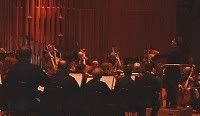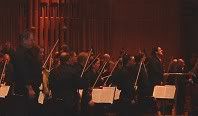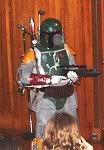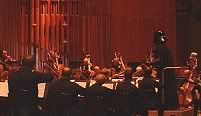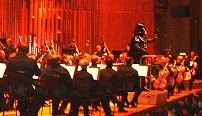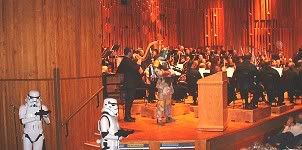 ‘From Star Wars to Schindler’s List’
‘From Star Wars to Schindler’s List’
Barbican Hall, London, UK
Sunday, February 20, 2005
The London Synmphony Orchestra conducted by Dirk Brossé
Concert Review by ‘batmanand’
Having been fortunate enough to have got my ticket for this concert a number of months in advance, I was able to pick a fantastic seat, five rows from the orchestra and right in the centre. This being my first ever JW concert, I was not sure what to expect. The LSO, who I have seen only once before and never live, are well renowned as one of the best orchestras in the world, and as the evening began with the members taking their places to spontaneous applause, and conductor Dirk Brossé striding on stage with no baton, excitement welled up inside me. The concert hall was packed full – having sold out several weeks earlier – and the crowd was of all ages and nationalities. The programme for the evening was clearly a crowd-pleaser rather than an attempt to introduce some of Williams’ less well known works to the general public, but nevertheless for a first concert that was perhaps what I needed.
The evening began with the Superman March, played energetically by the LSO. The cellos were the centre of my attention for much of the piece, as I had never fully appeciated how much they have to do in a typical Williams piece. It is only live that you see just how well the Maestro uses the whole orchetra to its fullest. The xylophone was also an instrument I had not heard before in the March, but the LSO player made sure I caught it this time. The sound was simply fantstic, and the giant cymbal crashes were adrenalin-pumping. The brass, as always thoughout the evening and throughout the LSO’s JW scores, was superlative, proving why they would later in the concert be called the best brass section in the world. As the piece ended, the right mood had been created for the night, and everyone was hungry for more.
The “presenter” for the evening was Tommy Pearson (a classical music radio presenter and finalist in the first BBC Young Musicians competition many years ago), who through the evening made us all feel very welcome as well as interviewing members of the LSO, reading out greetings from Williams’ collaborators (Rick McCallum, George Lucas and Steven Spielberg) and introducing the pieces. The next piece, conducted with great gusto by Brossé, was Hedwig’s Theme fromHarry Potter. It was, to use a somewhat overused phrase, magical. The quiet at the beginning, the strings leading into the main horn statement and then the huge middle section with the Nimbus 2000 themes were spectacular. The brass, for me, outperformed the CD, and the timpani was great. The keyboard, which I did not realise existed until Pearson mentioned it later, apparently plays the violin part, and it is very difficult. The horns in the middle section were beautiful, and the harp shone. The ending burst was greeted with much applause.
The next piece was in a totally different direction. The Theme from Schindler’s List, with the violin leader of the LSO as the soloist, was hauntingly beautiful played live. Granted, the soloist was not Perlman, and I doubt anyone will ever match the remarkable performance he gave on the original soundtrack, but the still he was excellent. The opening part before the soloist comes in was fantastic. Aagain, the cellos were notable, and there truly was pathos in the music. Another Second World War piece followed, in the form of Hymn to the Fallen from Saving Private Ryan. To be honest, it was somewhat forgettable. Firstly, the lack of choir made it sound a bit weird. Also, the orchestra did get out of time a couple of times. Brossé was waving his hands like mad throughout. Despite all this, the LSO did get the key sections spot on, and it was an interesting listen nonetheless. I would have preferred to have heard something that did not require a choir, and something a little bit more different (something from A.I., or Minority Report for example).
If Hymn to the Fallen was a little disappointing, Adventures on Earth was a triumph. The only word to describe it is “wow”. The power, the beauty, the glory of the piece were all fully brought out by the LSO in a fabulous display of orchestral brilliance. Both the kinetic and the sentimental parts of the piece were played to their full. The ending, one of JW’s undoubted greatest moments, was just magnificent. The cyballs, the brass and above all the horns were out of this world. Near the end, the horns were held up high, and as the piece concluded I was in no doubt that I had just heard the best piece of live music in my life. It was orchestral magic. Afterwards, Pearson interviewed, to spontaneous applause, Maurice Murphy, the prinicipal trumpetter of the LSO. He is a true living legend, confirming the urban myth that the first notes he played for the LSO were those opening trumpet blasts in Star Wars in 1977. Calling Williams “the governor”, he said he loved the man, his music and his conducting.
To end the first half, two Star Wars pieces were played. Firstly was the Main Titles from Star Wars. Put simply, it was the best playing of it I have ever heard, including recordings. The LSO, buoyed by Adventures on Earth, were on top form. The Princess Leia’s Theme part was fabulous. The best part about it was that it was clear that the whole orchestra were having tremendous fun as well as making phenomenal music. The final piece of the half was the Imperial March, with Stormtroopers entering the concert hall to add atmosphere. It was thoroughly enjoyable, although played a little slowly for my liking. The brass, as always, was perfect, in this case overbearing and malicious. The playing was immaculate, and as we left the hall for a drink and an ice-cream, everyone in the audience agreed that the only thing they wanted the LSO to do better was to play for longer!
The Olympic Fanfare and Theme provided a rousing opening to the second half. The brass were again excellent, and the piece is such a fantastic celebration of orchestral majesty that it was not hard to see why the LSO relished the challenge. The strings were wonderfully rhythmic in the long end section. Brossé again conducted with passion, ensuring the pace never slowed and the brass flourishes were highlighted. The applause was still loud, confirming that the audience, whose appetite had been very much wheted by the first half, were still hungry for more. Next, one of my favourite parts of the evening. The Close Encounters of the Third Kind Suite is a piece I have never heard, from a score I am not very familiar with. To heard it for the first time, performed by the LSO, then, was a gift. The atonality at the beginning was played with remarkable skill by the strings, and the whole piece was lyrical, almost poetic. The oboe solo of those famous five notes was fantastic. The string playing thoughout was nothing short of virtuouso. After the music, Pearson introduced us to Neil Percy, the principal percussionist for the LSO. He was also full of praise for Williams, and revealed to us something I did not know: that Williams’ brother is a professional percussionist who almost performed on the recording of Harry Potter and the Philosopher’s Stone.
Next was the only really “non-standard” piece ofthe evening. The Main Theme from JFK is a wonderful piece too scarcely performed or heard on the radio (the same goes for the score). The woodwind were excellent, the trumpetters (who got a bow afterwards) outstanding. The piece is tender, restrained and emotionally charged; perfect on an evening of grand fanfares and famous themes. one of Williams’ most famous is of course the Raiders March, wonderfully played by the LSO. Except for one bum note near the beginning, the brass were as good as the original performance in the film. one truly gets an idea of how complex the orchetration of a piece like the March is watching it live, and my attention was drawn to the second violins, who seemed to be performing a complex counterpoint throughout. Marion’s theme was played better than on the soundtrack CD in my opinion, but the day was stolen by the trumpets, who thundered along with main motif fantastically well.
The Main Theme from Jurassic Park was the penultimate programme item. It was an energetic suite, and with no piano it cut between different bits of different cues. The main theme segued into the Island theme, and then the ending was from T-Rex Rescue. The trumpets and horns were again amazing. The strings in this piece are so symphonic, in the true classical tradition; such is Williams’ genius to bring this to the silver screen and the concert hall. one weird thing was a bells glissanto about halfway through the piece; a rare mistake or a later addition? Pearson then interviewed Nicole Wilson, a first violinist, about the Revenge of the Sith music they had just finished recording. Giving little away (the most we got was that the Imperial March does play when Anakin turns into Vader… now there’s a surprise!), but she seemed excited and exhilarated by the music.
The finale (we thought) was the Throne Room and End Title from Star Wars. Again, the combination of the LSO and Star Wars was irresistsible. With hints that the Throne Room will appear in the ROTS soundtrack, it was interesting listening to the piece, composed almost 30 years ago, and considering how apposite it will still be. Much of the piece was a repeat of what we had heard in the first half; not adventurous but definitely a crowd-pleaser and excellently played. As the last, glorious, chord was played, the audience clapped louder than ever. A standing ovation began, and within 30 seconds most of the audience was on its feet. Just as we thought we were about to leave, Pearson said “I think you want more”. We sat down, with no idea what was going to happen next. And what an ending it turned out to be.
Firstly, Pearson gave a “Williams update”. He is in LA now, writing War of the Worlds. We heard official confirmation that JW is going to do Memoirs of a Geisha. And then the LSO performedFlying, from E.T., to a grateful audience. The strings and woodwind had their turns to shine, the violins and flutes being particularly impressive. It was as good as on the original soundtrack; pacy, cellos leading the way, and in time. The brass was well restrained, and the greand ending was just gorgous. Just as we thought that there would be no more, Darth Vader, Boba Fett and the stromtroopers returned. Brossé and Vader duelled: Vader’s lightsaber snapping Brossé’s baton. The conductor, defeated, fled, leaving Vader to take the rostrum. From here, he conducted the LSO in one final piece, aptly the Imperial March, including Boba Fett who had held the percussionists to ransom and now took over the cymbals. Incidentally, in terms of musical quality, this performance was in my opinion better than before, as it was nearly at my prefered tempo. The brass leading the way with enormous gusto, it was flighty, weighty and above all fun. Brossé was then led back on in handcuffs like Chewie, and as the Dark Lord released him, everyone gave their final applause. No-one who left that concert hall can possibly doubt the genius of Williams, the LSO… or the conducting skill of a Sith! It was a triumph, and hopefully will be the repeated many times in the future.
Click here to read another review of this concert.
Click on the images to enlarge.
Another picture from the concert is available at TheForce.net

